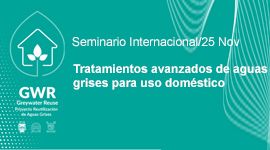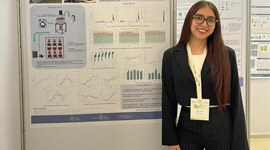You are here
Water Week in times of water crisis

This week the World Water Week is being held in Stockholm, both in person and online. This event is framed in a relevant need for our country related to the water crisis generated by the accelerated effects of climate change.
Since ancient times, mankind has intervened in the natural water cycle to ensure its availability as a fundamental pillar for the consolidation and development of civilization. Dependence on water resources is not only linked to economic development, but also defines the social and cultural evolution of communities and nations.
Today our country finds itself in a situation of water crisis that is developing at the pace of climate change, which has alarmingly exceeded the rate predicted by the scientific community.
The water crisis must be addressed holistically, integrating knowledge in a transdisciplinary manner at the level of diagnosis and strategies, as well as technical and technological solutions, and public policies. In this context, the conservation of water ecosystems, the development of water efficiency and conservation plans at the agricultural, industrial and household levels, the reuse of wastewater, the development of catchment systems and the development of tools to enable users to adopt good use and/or conservation practices are just some of the areas of action to be promoted. All of this requires planning, regulation and technical specifications defined at the territorial level with the participation and commitment of the public and private sectors, with government coordination to define a roadmap for the short, medium and long term.
Our grain of sand, or rather our drop of water, as an Inter-University Graywater Treatment Team (Usach-Unab-UBB) considers the exploration, research and development to reuse household graywater, integrating processes and facilitating the availability of information to implement technological solutions, strategies and policies, as well as cultural changes related to this issue.
Graywater represents only a fraction of household and total emissions, but its treatment and reuse can bring tangible and significant benefits to the community, and must be complemented by a wide range of other actions related to efficient water use. In the perspective of developing a circular economy, we cannot leave aside a vital resource such as water.
The consolidation of Industry 4.0 provides a set of tools such as artificial intelligence, nanotechnology, additive manufacturing and IoT, which must be analyzed in detail and integrated to ensure and protect the availability of water resources.
Our commitment from academia is to contribute, facilitate and articulate the debate, research and implementation of solutions and policies related to water as a fundamental pillar of social and economic development of the country.
Dr. Julio Romero, Researcher Universidad de Santiago, Greywater Treatment and Reuse (GWR) Project.
News
 A successful seminar was held on advanced gray water treatment and...
A successful seminar was held on advanced gray water treatment and...
 The international academic network will present its advances in gray...
The international academic network will present its advances in gray...
 The GWR Project attended the Chemical Engineering Congress.
The GWR Project attended the Chemical Engineering Congress.

